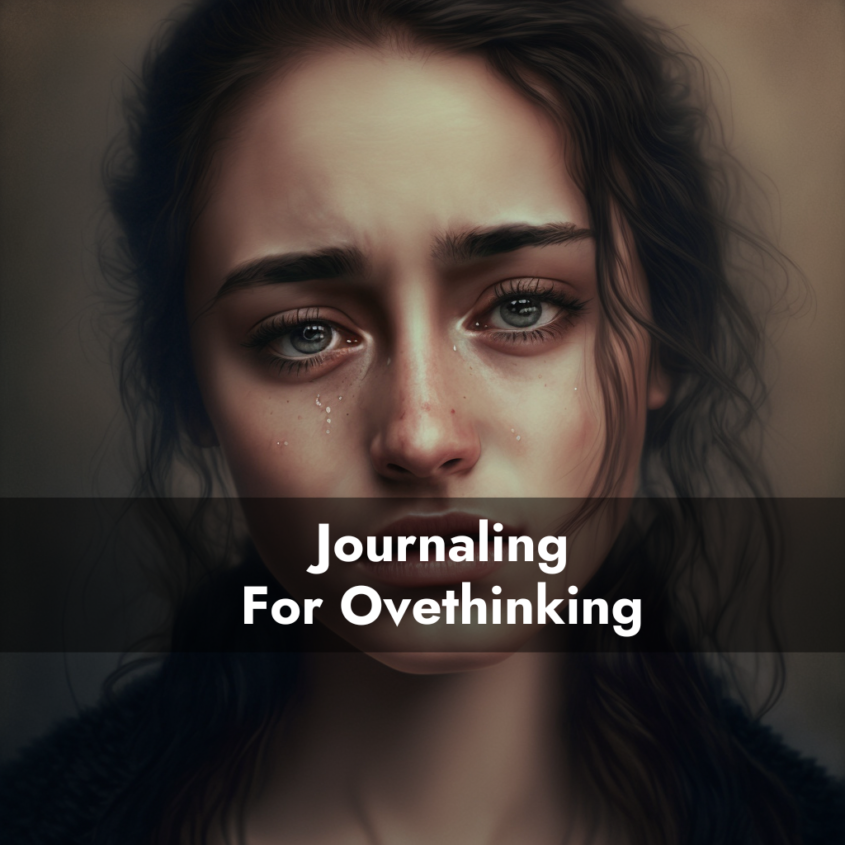
65 Powerful Journal Prompts For Overthinking
Table of Contents
Difference between those who journal and those who don't
| People who journal |
| Have a better understanding of their own thoughts and emotions |
| Are better able to manage stress and anxiety |
| Are good at setting and achieving goals |
| Experience increased creativity and problem-solving skills |
| Tend to have better memory recall and cognitive processing, as writing helps to solidify memories and organize thoughts |
| People who don’t journal |
| May have less clarity and insight into their own experiences |
| May struggle more with stress and anxiety |
| May have a harder time setting and achieving goals |
| Are more likely to feel stuck in negative thought patterns and limiting beliefs |
| Tend to rely more on external validation, rather than developing a strong sense of self-awareness |
How to use these Journal Prompts For Overthinking
- Find a quiet place where you won’t be interrupted.
- Set aside some time to write, whether it’s a few minutes or a longer period of time.
- Choose one of the prompts that resonate with you and start writing.
- Write freely, without worrying about grammar or spelling.
- Reflect on what you’ve written, looking for patterns or themes that emerge.
- Consider how you can use this information to manage your overthinking.
- Use these prompts as a starting point for further exploration, either through additional journaling or by talking to a therapist or trusted friend.
- Repeat this process regularly to gain greater insight into your own thought patterns and develop new strategies for managing overthinking.
Journal Prompts For Overthinking
Introduction
If you are looking for the 65 Journal Prompts for Overthinking then go to this part of the article.
Overthinking can be a common habit that leads to feelings of anxiety, worry, and stress. It can be challenging to get your thoughts under control, and that’s where journaling comes in. Journaling can be a powerful tool to help you process your thoughts, emotions, and feelings, allowing you to work through them in a safe and productive way. In this article, we’ll explore how journaling can help with overthinking, and we’ll provide some journal prompts and tips to help you get started.
How to Journal for Overthinking
To journal effectively, set aside time each day to write down your thoughts. You don’t need to dedicate a lot of time to journaling, even 10-15 minutes can make a big difference. Find a quiet, comfortable space where you won’t be interrupted and start writing. It’s important to write by hand as opposed to typing on a computer. Writing by hand slows down your thoughts and forces you to focus on each word, making it easier to manage your thoughts.
Mindfulness To Prevent Overthinking
Practicing mindfulness while journaling can also be helpful in managing overthinking. Focus on the present moment, your breath, and your surroundings. Pay attention to your thoughts and feelings without judgment, and then write them down. Mindful journaling can help you become more aware of your thoughts, allowing you to identify patterns and triggers that contribute to overthinking.
In addition to journaling, incorporating mindfulness meditation into your daily routine can also be effective in preventing overthinking. This involves setting aside a few minutes each day to sit in a quiet place and focus on your breath, allowing your thoughts to come and go without judgment.
Through daily practice, mindfulness meditation can help you become more aware of your thought patterns and create space between your thoughts and reactions, which can reduce the tendency to get caught up in overthinking. Studies have also shown that mindfulness meditation can help improve mood, reduce stress and anxiety, and enhance overall well-being.
Crystal For Healing
Crystals for healing are also very beneficial when dealing with overthinking. Crystals work by balancing the energy in your body, clearing blockages, and removing negative energies. When you use crystals, you allow their energy to interact with your own, and this helps to align your thoughts and emotions. As a result, you can feel more centered, focused, and positive.
Here are 15 Powerful Crystals For Overthinking and How To Calm Your Mind to Find Peace
Writing Everything Down Using Journal Prompts For Overthinking
When journaling for overthinking, write everything down, including the negative thoughts and feelings you’re experiencing. Don’t hold back or judge your thoughts, just let them flow onto the paper. The goal is to get everything out of your head and onto paper so that you can look at your thoughts from a different perspective.
It can be helpful to use journal prompts for overthinking to guide your writing and prompt deeper reflection. By using prompts, you can dive deeper into specific areas that you may be struggling with and gain greater clarity and understanding.
Remember to be patient and gentle with yourself as you explore your thoughts and feelings, and try to approach your writing with a sense of curiosity and openness. Over time, you may find that journaling becomes a valuable tool for managing overthinking and improving your overall well-being.
Challenge your Unhelpful Thoughts
Once you’ve written everything down, read back over your journal entries and look for unhelpful thoughts or limiting beliefs. Challenge these thoughts by asking yourself if they are true or if there is another way to look at the situation. For example, if you’re worried about a decision you made, ask yourself if you made the best decision you could at the time based on the information you had.
Another effective way to challenge unhelpful thoughts is to practice cognitive restructuring. This involves identifying and changing the negative thought patterns that contribute to overthinking. Start by identifying the negative thoughts that often come up for you, such as “I’m not good enough” or “I always mess things up.”
Once you’ve identified these thoughts, challenge them by asking yourself for evidence that supports or refutes them. For example, if you believe that you’re not good enough, ask yourself for examples of times when you have succeeded or received positive feedback. By actively challenging your negative thoughts, you can reframe them in a more positive and realistic way, which can reduce overthinking and improve your overall well-being.
If one of the reasons why you overthink is a financial worry, then I recommend you to check out these Journal Prompts For Money Mindset.
If you are a sensitive person, these journal prompts for overthinking are the perfect antidote to overthinking. Some people are naturally more attuned to their thoughts and emotions, and journaling can be an effective way to manage their heightened sensitivity. Here are some journal prompts to stop overthinking:
- What problem am I actually trying to solve?
- What is the very next step?
- What would someone who loves me dearly say to me right now?
- What can I do today to restore my energy?
- What is really, really hard right now?
- If it could be easy, what would that look like?
- Where in my body do I feel stress or tension?
- What am I giving significance to that doesn’t need it?
- Is this true? What else could be true?
- What three things am I really grateful for — and why?
- If criticism didn’t exist, what would I be doing differently?
- Who can I ask for help?
- Who could use my support right now?
- What do I fear the most in this situation?
- What limiting beliefs are holding me back?
- How is my overthinking impacting my daily life
- What can I learn from this experience?
- What assumptions am I making that may not be true?
- How can I reframe this situation in a positive light
- What can I do to prioritize my mental health?
- What past experiences are influencing my current thoughts?
- What is the worst-case scenario and how likely is it to happen?
- What would happen if I stopped worrying about this issue?
- How can I be more present and be in the moment?
- What is the root cause of my overthinking?
- What advice would I give to someone else going through this?
- How can I be kinder to myself in this situation?
- What are some positive things I can focus on instead of overthinking?
- What is something that has helped me in the past when I felt overwhelmed?
- What would be the best-case scenario and how can I work towards it?
- How can I practice self-compassion during this time?
- What would be the worst thing that could happen if I let go of my overthinking?
- What can I do to stay calm and centered in this moment?
- What would I do if I weren’t afraid?
- How can I challenge my negative thoughts?
- What are some things I can do to improve my mood right now?
- What is the one thing I can do today to make progress?
- What are my values and how can they guide me in this situation?
- What is the best way to communicate my feelings to others?
- What are some ways I can practice mindfulness?
- What is the best way to take care of myself during this time?
- What is the one thing I’m avoiding that I need to face?
- How can I set realistic expectations for myself?
- What is the one thing I’m grateful for in this moment?
- What is the one thing I can let go of today?
- What is the one thing that is within my control right now?
- How can I practice acceptance in this situation?
- What is something I’m proud of myself for?
- What is the one thing I need to forgive myself for?
- What is something that brings me joy and how can I incorporate more of it into my life?
- What is the one thing I can do to take care of my physical health?
- What is the one thing I can do to take care of my emotional health?
- What is something I’m looking forward to in the future?
- What is the one thing I can do to show kindness to someone else?
- What is something I’m learning about myself during this time?
- What is the one thing I can do to show gratitude towards others?
- What is something I need to let go of in order to move forward?
- What is something I’m curious about and want to learn more about?
- How can I set boundaries in order to prioritize my mental health?
- What is the one thing I can do to challenge myself?
- What is something I need to apologize for and how can I make amends?
- What is the one thing I can do to make someone else’s day better?
- What is the one thing I can do to show love to myself today?
- What is the one thing I can do to let go of perfectionism?
- How can I use my overthinking as an opportunity for growth and self-awareness?
Benefits of Journaling Beyond Overthinking
Journaling has numerous benefits beyond just managing overthinking. Regular journaling can help reduce stress levels, improve memory, and boost mood. Journaling has also been shown to improve physical health by boosting the immune system and reducing inflammation.
In addition to the mental and physical benefits, journaling can also help you gain insight into your own emotions and behaviors. Writing about your experiences and feelings can help you identify patterns and triggers, giving you the power to make positive changes in your life. Additionally, journaling can be a creative outlet, allowing you to explore your creativity and express yourself in new and unique ways. It can be a powerful tool for personal growth, self-reflection, and self-discovery. By taking the time to write in a journal, you can gain a deeper understanding of yourself and the world around you.
Journaling is not just a means of managing overthinking, but a powerful tool for improving mental, physical, and emotional well-being. By reducing stress, improving memory, boosting mood, enhancing physical health, gaining insight, and encouraging creativity, journaling offers a myriad of benefits that can enrich your life in countless ways. So why not make it a daily habit and reap the rewards of this simple yet transformative practice?
Does Journaling Help With Overthinking?
In short, the answer is yes, journaling can help with overthinking. When we overthink, our minds can become overwhelmed with thoughts and emotions, making it difficult to focus and find clarity. Journaling provides a way to get these thoughts out of our heads and onto paper, allowing us to process them more effectively. By challenging our unhelpful thoughts and practicing mindfulness, we can use journaling as a tool to overcome overthinking and improve our overall mental and emotional well-being.
Moreover, journaling is a simple and accessible tool that can be practiced anywhere, anytime. Whether you prefer to journal in the morning, at night, or throughout the day, there is no wrong way to do it. Journaling can be adapted to fit your individual needs and preferences, making it a versatile tool that can be incorporated into your daily routine. With regular practice, journaling can help you develop greater self-awareness, emotional regulation, and resilience in the face of overthinking and other mental health challenges.
If you are looking to deal with overthinking using crystal healing, check out our article 15 Powerful Crystals For Overthinking: How To Calm Your Mind And Find Peace

Check out other trending articles that might be of interest for you:
- Try this Low Dopamine morning routine to start your day in alignment
- Are you looking to win your ex back? Check out The Whisper Method Manifestation
- 100 Positive New Job Affirmations To Excel In Your New Job
- 50 Abundance Quotes To Inspire The Abundance Mindset Of Prosperity
- 10 Great Ideas For A Daily Manifestation Practice
- What’s Soul Alignment Method & How To Align With Your Soul
- 15 Powerful Crystals For Overthinking: How To Calm Your Mind And Find Peace
- 25 Limiting Beliefs Quotes And How To Overcome Common Limiting Beliefs
- 10 Great Ideas For A Daily Manifestation Practice
- 9 Shocking Ways How Can Manifestation Backfire
- 155 Powerful Abundance Affirmations For Manifesting Abundance
- 10 Habits Of Positive Minds You Can Adopt Today
- Power Of Bay Leaf Manifestation: The Simple Ritual To Attract An Abundant Life














// Comments //
// Trackbacks & Pingbacks //
[…] out these journal prompts for overthinking or these journal prompts for money […]
[…] 65 Powerful Journal Prompts For Overthinking […]
[…] Does Journaling Help With Overthinking? […]